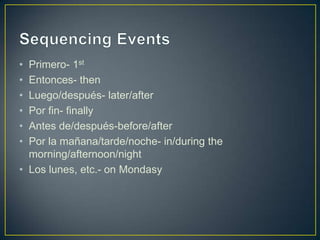Este documento proporciona una lista de temas gramaticales en español, incluyendo nacionalidades, verbos con cambio de raíz, pronombres, el verbo gustar, superlativos, reflexivos, comandos afirmativos y negativos, eventos en el pretérito, y más. Explica conceptos como el uso de pronombres, conjugaciones verbales, modales y progresivos. Además, ofrece ejemplos de cómo formar adjetivos y adverbios superlativos y cómo modificar un verbo con adverbios.




















